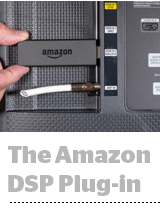 When Amazon opened its Fire TV video advertising supply to outside demand for the first time, with The Trade Desk and dataxu as inaugural DSP partners, it broke new ground in programmatic CTV.
When Amazon opened its Fire TV video advertising supply to outside demand for the first time, with The Trade Desk and dataxu as inaugural DSP partners, it broke new ground in programmatic CTV.
The partnerships enable buyers on The Trade Desk, dataxu and Amazon’s own DSP to access Fire TV impressions exclusively through a private marketplace (PMP) in the U.S. developed by Amazon Publisher Services (APS), the sell-side technology group that also operates Amazon’s header bidding product.
Beginning last October, Amazon required all ad-supported programmers on Fire TV to cede 30% of ad impressions to Amazon.
APS’s ownership of the product is important because the group has roots in real RTB programmatic, said dataxu CEO Mike Baker.
Some broadcasters have addressable TV capabilities, like AT&T’s Xandr or Comcast’s FreeWheel, but don’t auction impressions in real time, as digital video ad impressions are bought and sold, Baker said, adding that Amazon’s CTV product is closer to programmatic because it serves ads in real time based on deal IDs.
Amazon declined to comment.
Baker said true programmatic integrations are often held up because major broadcasters are reluctant to expose inventory to exchanges. Upfront pricing deals are very lucrative, and networks don’t want to commoditize inventory or incentivize major brands to withhold budgets if they can buy TV ads programmatically for less.
The inclusion of a deal ID that can be pegged to a user, a mobile device or a smart-TV ID is also critical for programmatic players, because it allows for frequency capping and digital performance metrics. For instance, it can be tied to a user by cookies or to foot traffic by re-identifying a smartphone at a dealership after a car brand serves a Fire TV ad.
Making the anonymized ID available to outside DSPs is a “monumental move by a big tech player, and a breakthrough in CTV,” The Trade Desk CEO Jeff Green wrote in an internal memo on the partnership.
The Trade Desk declined to comment.
Amazon is also opening up its entire Fire TV inventory set to outside bidders, except for Amazon-owned media like IMDb TV. Other major CTV inventory sources, like Google and Hulu, reserve portions of top-flight inventory for their own ad services.
Amazon’s programmatic platform strategy has more in common with Roku’s, according to Tracey Scheppach, co-founder and CEO of the TV and video ad consultancy Matter More Media. Fire TV has pulled close to even with Roku in terms of consumer adoption, leaving Google’s Chromecast and Apple TV far in their wake.
Amazon’s move last year to siphon 30% of impressions on Fire TV also mirrored Roku, which has the same policy for ad-supported programmers on Roku devices.
The Trade Desk and dataxu don’t have access to conversion data from Amazon’s marketplace. But if the DSP has a direct deal with Viacom’s Pluto TV app, say, it can match those audiences in the PMP based on the device ad ID.
The transaction data is owned by a different business within Amazon, the retail marketplace team, and those internal Amazon units don’t share data, Baker said. Or if they do, they only share amongst themselves and it’s a black box service for buyers.
“It sometimes can be hard to get a handle on who you’re working with and where data and inventory is coming from,” Baker said, because Amazon has so many unaffiliated but synergistic video initiatives, including APS, Twitch, IMDb TV and the Prime Video group.
But having the early connections into Amazon could pay off handsomely, he said if and when the ecommerce giant uncorks its conversion data or unifies its video offerings into a more cohesive platform.
“This agreement is an important indicator of where the industry is going, and will become just one of many, over time,” Green wrote to employees. “APS is supporting the open internet, in contrast to other big tech walled gardens. It’s a bold move which may drive action from other CTV aggregators.”











